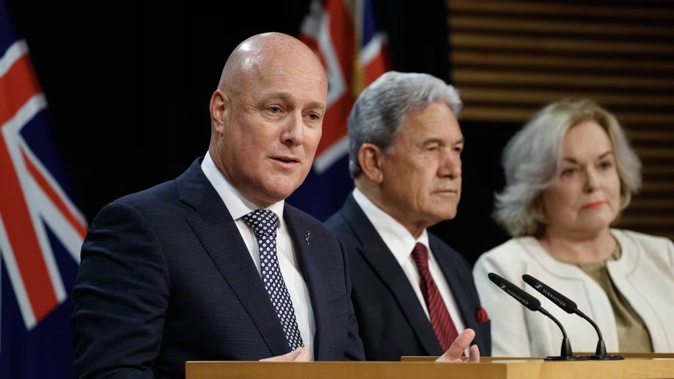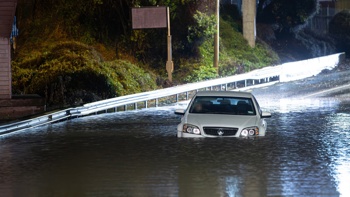
Labour and the Greens have warned the Government’s decision to deploy six New Zealand Defence Force personnel to the Middle East risks enmeshing New Zealand in one of the region’s interminable wars.
Prime Minister Christopher Luxon announced on Monday that personnel would be deployed to the Red Sea as part of an ongoing US-led mission to strike Houthis who had been attacking shipping vessels from Yemen.
Labour’s Foreign Affairs spokesman David Parker said there was no UN mandate for the strikes, and a number of like-minded countries, particularly in Europe have steered clear of joining the US-led campaign.
“There’s no UN mandate... It’s telling that a large number of European countries including the Scandinavians are staying out of this,” Parker said.
He noted a comparison between this decision and the decision that faced Helen Clark’s Labour Government over joining the US-led invasion of Iraq in 2003, when Parker was in his first term as an MP. Clark ultimately stayed out of that conflict although she did deploy a naval frigate to the Persian Gulf to help in the interdiction of Al Qaeda terrorists, at the request of the US.
“The Labour Government at the time thought it was wrong to be embroiled in a Middle Eastern conflict, particularly as there was no UN resolution... we chose to stay out and I think history shows that to be the right decision,” Parker said.
“Similar principles apply here,” Parker said.
The Green Party co-leaders James Shaw and Marama Davidson released a statement warning that the deployment was “only likely to inflame tensions.
“When the US asks us to support their military operation, questions need to be asked about the strategic interests the US is prioritising and whether these align with the clear support of the New Zealand people for our defence force to be focused on peace-building and enduring justice,” they said.
Luxon said the deployment was about keeping trade routes open and preserving freedom of navigation. Houthis have recently been targeting ships passing through the Red Sea in an act of solidarity with Palestinians in Gaza.
- NZ sending Defence Force team to Middle East to provide maritime security in Red Sea
- Foreign Affairs Minister Peters unwilling to disclose Defence Force team details, location
- Proposed two-state solution unlikely to stop Israel, according to expert
“Freedom of navigation is an integral part of New Zealand’s prosperity and our trade security,” Luxon said.
He said the Houthi rebels had chosen to “defy” international warnings to stop.
Foreign Minister Winston Peters said the Government’s goal was to “protect the prosperity and security of New Zealanders.
“The illegal attacks on commercial naval vessels pose an economic threat to our trading nation by imposing supply chain costs for our exporters and importers as a consequence it also impacts the cost of living here,” he said.
Peters warned that supply chain disruptions to the likes of food and medicine meant the attacks were putting “millions of innocent consumers worldwide” at risk.
Defence Minister Judith Collins would not say which Defence Force department would deploy the troops, or even which country they would be stationed in, citing security concerns for her secrecy.
“They will be at operational headquarters in the wider Middle East region and elsewhere, but they will not go into Yemen. The New Zealand Defence Force team will hold a number of roles at operational headquarters, but... we cannot go into specifics for security reasons,” Collins said.
New Zealand has had personnel involved in maritime security in the Middle East since 2013. Currently 12 personnel are deployed in that mission, known as operation Pukeko.
Some shipping companies have begun rerouting their ships around the Cape of Good Hope in South Africa, adding 10 days to a ship’s travel time - that added travel time gets passed on in the form of higher costs to consumers. The sheer volume of trade that passes through the Red Sea means that those higher costs would have a large impact.
Approximately 12 per cent of global trade passes through the Suez Canal, which is adjacent to the Red Sea, where the attacks have occurred - about 50 major ships a day. It links Europe to Asia, and the route represents 30 per cent of all global container traffic, mainly finished goods heading between China and Europe. The canal carried one billion tonnes of cargo in 2019, four times the tonnage transiting the Panama canal.
Critical to New Zealand is disruption to shipping routes for Middle Eastern oil, which can transit through the area, where it is refined ahead of being exported here. Critical for the world is disruption to exports of grains and cereals, a key determinant of global food prices. Small changes in global food prices can have a large impact global poverty, as basic crops become too expensive.
A pre-pandemic Chatham House paper found 14 per cent of cereals passed through the Suez Canal, and nearly a third of European, Ukrainian and Russian grain exports pass through the canal - those exports are already heavily disrupted thanks to the war in Ukraine.
Take your Radio, Podcasts and Music with you









